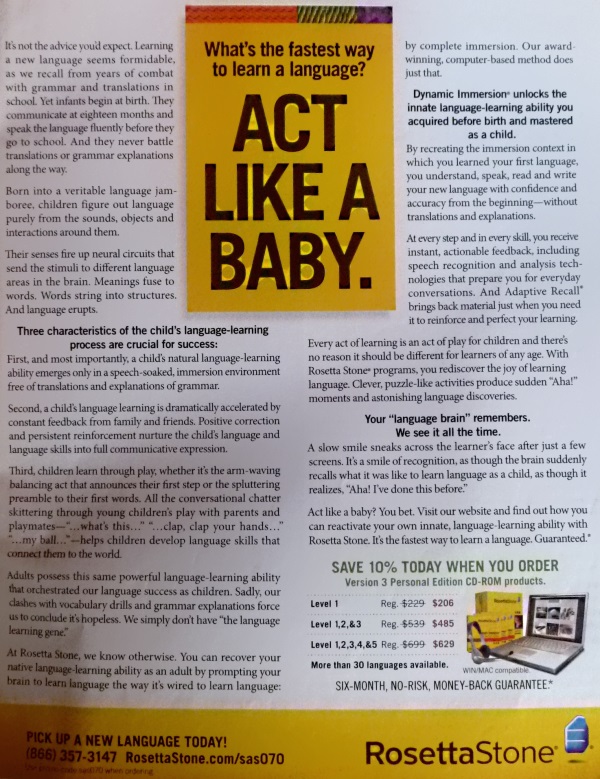A while ago, I saw a full page ad for Rosetta Stone (a language learning software company) in the Scientific American in an Istanbul hostel. I had to take a photo because I was so shocked at the content. (Transcript is on this page.)

I’ll ignore the wordiness. It probably makes sense for the Scientific American. And the disclaimer is that I have no idea how Rosetta Stone works and the degree to which it is effective. But boy are the claims questionable.
Research shows that merely using putting a picture of a brain or irrelevant neuroscience information will make an explanation seem more credible. bit about how babies use — gasp! — their brains to learn language is priceless.
There’s a great term – neurobabble – that encompasses gratuitous, poppy references to neuroscience whose main aim is to push a predetermined viewpoint. This has also spilled over into educational products where there are often exaggerated neuroscience claims. See for example this criticism of Lumosity’s “brain training claims”.
The ad relies on a view of language learning in children that’s at odds with at least what I learned in my linguistics major – and it looks like the consensus hasn’t changed.
People often have an intuitive view that babies “learn” language from their parents, who have to take an active role in shaping the learning experience through interaction, corrections and so on. The idea is basically that parents “teach their children to talk”
.
The facts are a little bit different. Children actually need surprisingly little to “learn” their first language. In fact the process of learning a first language is so different to learning subsequent languages that in the Chomskean paradigm (still pretty dominant in linguistics for good reason!), it might be better described that they “acquire” it. Become a fluent speaker in your native language can be done by the vast majority of children regardless of intelligence level. It requires only a little bit of input in terms of seeing language used. However, there are cultures where parents don’t spend a lot of time talking to children as they consider it useless, and they grow up to be native speakers. And most importantly, parents correcting children’s speech is completely useless (contra Rosetta Stone’s ad) since ultimately we all grow up to be fluent speakers regardless of our parents’ efforts.
Chomsky’s actual explanation for this state of affairs is of course subject to disagreement and falsification but as far as I know it’s still doing very well within linguistics. I’ll outline the basics but for more detail from those with actual booksmarts, this article is a good start.
The idea is that humans are innately wired for first language acquisition in the same way that our biology allows for babies to, say, learn to walk. This includes babies’ brains coming with some fairly specific expectations of what their family’s language will look like. The argument for this is called the “poverty of the stimulus”, namely that babies aren’t exposed to enough data to acquire a language if they use very generic learning techniques. So a large part of the Chomskean program is investigating the underlying similarity between languages, even if they appear very different to laypeople.

A key aspect of all of this is that it only applies to your first language. We’re only wired to acquire our native language, the rest we have to learn. This is why very very few non-native speakers of a language can speak it without accent or some grammatical hiccoughs. That’s why people can be living in a country for 40 years and speak with an accent. They’re not stupid or bad at languages or lazy. We just don’t have the brain wired to soak it in without effort. Of course it’s a bit more complicated than that with multi-lingual societies but for English speakers in an English speaking country it’s pretty close.
So where does this leave the Rosetta Stone ad?
- It starts up with some neurospeak (in my opinion, neurobabble) about infant brains to set the scene for the ad’s claims being all sciencey.
- Infants do not need the type of involvement and immersion the ad seems to suggest. In fact, one of the major areas of research is how they manage to acquire a language at all given how big the task is, and how meagre the input. Sure, it’s pointless to teach them grammar – but that doesn’t say much about these exercises for adults. Exaggerated statements about just what babies need for language can also contribute to the culture of worry that parents face.
- Parental corrections have been shown to be pretty pointless and unnecessary so the idea that they dramatically accelerate learning is just bizzare. Babies acquire language in stages. For example, when they first acquire basic rules they are too consistent – preferring (say) “foots” to “feet”. Telling them to progress to the stage where they’ve integrated the many exceptions of English is pointless.
- Most importantly, adults do not possess the same language acquisition ability as children. We need to do the hard slog. It might be true that immersion is generally the best method – I don’t know. But if Rosetta Stone had a method that really allowed for an adult to acquire a language like a child, it would turn a LOT of neurology and linguistics upside down. Just saying.
It’s important to be especially skeptical when looking at any ads with neuroscience in them. They’re very prone to being misleading, even if it’s for a reputable product in a reputable magazine.




0 Comments